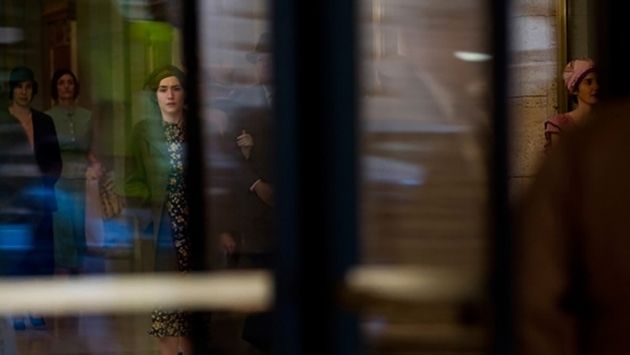
Michael Curtiz's 1945 noir classic with Joan Crawford became an unofficial Mother's Day film and made Crawford an emblem of saintly mother for generations of people, even though the ending suggests even a saint won't protect a murderous offspring. Written by pulp writer James M. Cain (Double Indemnity, Postman Always Rings Twice), the Depression era Southern California set Mildred Pierce is a highly melodramatic film about conflicting American values which are surprisingly not too different from our current society in the 21st century: a very Ayn Rand style self determination, the pitfall of class differences and star envy, thankless motherhood and the bad seed....
I'm not a fan of old Hollywood melodramas and don't claim to be Douglass Sirk aficionado. I haven't seen Haynes' parody/elegy to Sirk, Far from Heaven. But I really dug I'm Not There, his inventive take on Bob Dylan's public persona and Velvet Goldmine, about Glam Rock era and admire his artistry on parodying something he loves with so much affection and care. With this five part mini-series, Haynes is apparently a lot more faithful to the Cain's source material than Curtiz's very studio version with 7 writers credit attached (William Faulkner was supposedly involved).
Haynes's version is a handsome, impeccably recreated period piece. The great Kate Winslet plays a title role, married to a good-hearted but luckless, ambitionless Bert living in the Los Angeles suburb. After debts pile up and Bert's not up to providing, she divorces him and starts looking for menial work. Just like any mother would do, she wants to provide her two daughters with all the material goods. Older daughter Veda resents her working as a waitress at a hash diner. Mildred builds up an empire of restaurants named after herself, but nothing of her success is impressive under the scornful eyes of increasingly hauty Veda. Talking like Grace Kelley in pictures, Veda becomes a manipulative and unbelievably snotty bitch.
Haynes, obviously loves the hightened melodrama - a younger daughter dies of pneumonia while Mildred is having a night of passion with a LA playboy Monte (Guy Pearce), who largely figures in to the fiery finale, Veda's ridiculously theatrical mannerism, Mildred keeps saying, "I'm size ten!" out loud to anyone who care to listen. There are a lot of face slapping, a lot of yelling, a lot of emotional fireworks.
Edward Lachman's sumptuous cinematography reveals something more sinister from the chapter one. Throughout the whole series, Mildred is seen through a glass windows and display cases, giving the audience the slightly distorted images of her. It becomes all clear in Veda's final accusation in the series's finale- that she used all the men around her to her advantage - Bert, Wally and Monte, non of whom are portrayed as a typical male bruts or evils but rather sheepish and powerless. That her rise and fall has more to do with the highly materialistic world we live in. That in fact Veda, however manipulative and artificial she seems, is the one who saw, unveiled eyes, Mildred's pathetic middle class ambition - the hollow American dream, while sacrificing 'family'.
Evan Rachel Wood who plays older Veda eschews the hammiest role in the latter part of the series. Her spiteful, opportunistic beauty gets the ultimate revenge on her forever low-class mother by becoming an opera singer, then sleeping with Monte, a has-been playboy and emasculated, newly minted husband of Mildred. When it is first revealed this handsome playboy is dating her dumpy mother, Veda's thought is surely not "oh fuck, my mom rocks!" As she snarls through the dark sleeping chamber of her Monte, fully naked and touching her vagina in front of her mother is perhaps the most perverted and delicious revenge scene in any films in recent history.
This deconstruction of the saintly mother Crawford is what's most interesting about Haynes' interpretation. As Crawford's Mildred finally abandons her bad seed to incarceration, Winslet's Mildred finally, bitterly utters, "To hell with her!" But there is no recognition in her eyes registering what Veda said about her being an opportunist. Mildred Piece shows how skillful Haynes is at presenting a melodrama so perfectly put together but at the same time, sees the cracks in this otherwise sordid story and elevate it to a subversive social commentary.
No comments:
Post a Comment